Coins of famous Roman rulers
In alphabetical order
Marcus Antonius (Marc Antony)
Born c. 83 B.C., Died 30 B.C.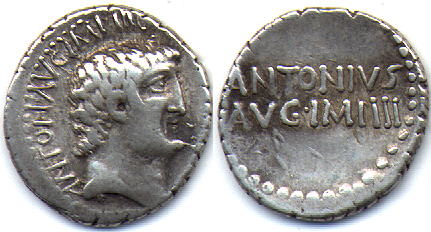
Silver Denarius, 18 mm
O: Head of Marc Antony, the artists signature "P" concealed in hair behind the ear.
R: Inscription
Athens mint, summer of 32 BC
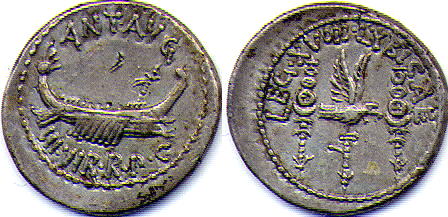
Silver Denarius, 19 mm.
O: War-ship facing right, with rowers. Military standard
at prow. The inscription, in Latin, names Antony as Triumvir.
R: Eagle between two military standards. Legend LEG XVIII
LYBICAE names the 18th legion.
Eastern mint, c. 31 B.C.
These coins were struck in large numbers, naming individual legions,
in order to pay the troops in preparation for the upcoming battle with
Octavian.
A cousin of Julius Caesar, Antony was chosen Caesar's co-consul for 44 BC. He tried in vain to have Caesar made emperor. After Caesar's assassination, Antony, Octavian and Lepidus formed the Second Triumvirate (43 BC). Antony then defeated Brutus, assassin of Caesar, at Philippi (42 BC) and set out to reorganize the eastern provinces. While in the Eastern provinces, Antony met and was captivated by Cleopatra VII, Queen of Egypt, with whom he lived in idleness and luxury. Antony's relationship with Octavian soon become strained, as each sought supremacy at Rome. Reconciliation was arranged in 40 A.D., with Antony's marriage to Octavian's sister, Octavia. Antony, however, soon abandoned Octavia to return to Cleopatra. In 32 BC, Antony divorced Octavia, and Octavian obtained the annulment of Antony's powers as triumvir along with a declaration of war. In 31 BC at Actium, Octavian decisively defeated Antony and Cleopatra who fled to Alexandria. Antony and Cleopatra committed suicide in 30 BC.
Augustus (Octavian)
Roman Emperor, 27 BC - 14 AD
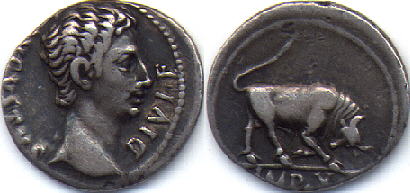
Silver Denarius, 19 mm, 3.8 grams
Obverse: Head of Augustus. AVGVSTVS DIVI F
Reverse: Bull butting, IMP X below.
Minted at Lugdunum (modern-day Lyons, France), 14 - 12 BC.
The great-nephew of Julius Caesar, Gaius
Octavius (Octavian) became Caesar's adopted son. Following
Caesar's assassination, Octavian raised an army and extorted an unconstitutional
consulship from the senate (43 BC.) He concluded a deal with his
arch-rival, Mark Antony which divided power among
them (the deal also included Lepidus as the so-called Second Triumvirate).
A later redivision of power gave Octavian the entire western half of the
Roman world, and Antony the eastern half. While Antony was distracted
by warfare with Parthia and his liaison with Cleopatra,
Octavian undermined Antony in Rome. In the Battle of Actium,
31 BC, Octavian defeated Antony and Cleopatra and became the sole ruler
of the Roman world.
"Augustus" was the title of honor conferred on him
in 27 BC by the Senate. He ruled until 14 AD. His long reign was
a time of peace and reconstruction at home, sound administration, and steady
conquest abroad.
Marcus Junius Brutus
Roman Statesman, Assassin of Julius Caesar, d. 42 BC
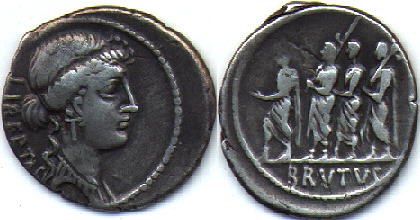
Silver Denarius, 20 mm, 3.9 grams
O: Head of Libertas, personification of Liberty.
R: L. Junius Brutus (second from the right) walking in precession,
led by accensus and flanked by lictors.
Rome mint, 54 BC.
In late Republican Rome, moneyers were appointed yearly and often honored
their families on the coin designs. M. Junius Brutus served as moneyer
in 54 BC. On his coins, he affirms his commitment to liberty on the
obverse. On the reverse, he commemorates a distant ancestor.
L. Junius Brutus was legendary for expelling the last of the kings to rule
Rome and establishing the Republic in 509 BC.
Marcus Junius Brutus, also known as Quintus Caepio Brutus, achieved fame as a reluctant leader in the assassination of Julius Caesar .
On both his father's and mother's sides, Brutus claimed descent from early Roman statesman legendary for their fights against tyrants and kings and in favor of the Republic. His mother, Servilia, was a half-sister of Cato the Younger and is believed to have had a long affair with Caesar. Indeed, Caesar may have regarded Brutus as his natural son.
In the complex politics of Rome, Julius Caesar viewed Brutus as his protégé. Despite good treatment from Caesar, Brutus supported Pompey in the civil war between Caesar and Pompey. The decision was even more striking as Pompey had killed Brutus' father. Apparently, Brutus had made his decision in favor of Pompey in support of the Republic and against Caesar's relentless consolidation of power. After the defeat of Pompey, Caesar pardoned Brutus and treated him well, making him governor of Cisalpine Gaul in 46 and the top praetor in Rome in 44 BC.
Nonetheless, Brutus joined the conspiracy against Caesar. His motives, presumably, were to attempt to save the Republic from Caesar's tyranny and royal aspirations.
Julius Caesar was murdered on the Ides of March, 44 BC. The conspirators had no realistic follow-up plan . Defeated by Mark Antony and Octavian, Brutus committed suicide following the battle of Philippi in 42 BC.
Gaius Julius Caesar Germanicus ("Caligula")
Born 12 A.D., Emperor of Rome, 37-41 A.D.
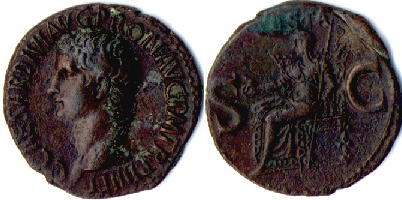
Copper As, 28 mm
O: Caligula facing left.
R: Vesta veiled and seated left, pouring from a patera.
Rome mint.
Caligula grew up in a military camp where his father's soldiers nicknamed him Caligula ("Little boots"), but his official name as emperor was Gaius Julius Caesar Germanicus. His father died in 19, and his mother and two elder brothers perished in the purge organized by Tiberius. Caligula succeeded, however, in gaining the confidence of Tiberius, and from 32 he lived with the recluse emperor on Capri.
Upon the death of Tiberius, Caligula became the third emperor of Rome. He pledged cooperation with the Senate, but he soon began to rule in an autocratic manner. Senatorial propaganda asserted that after an illness in October 37 he became mentally unbalanced. To denigrate the senators, he bestowed the consulship on his horse. His military operations on the Rhine in 39-40 were totally ineffective. He was murdered in a plot conceived by an officer of the Praetorian guard and was succeeded by his uncle Claudius I.
Diocletian
Roman Emperor, 284-305 AD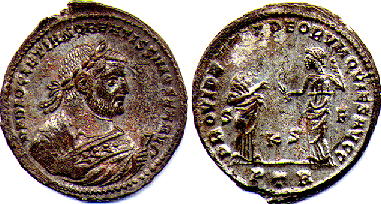
Follis, copper showing through silver wash, 27 mm.
Obverse: Bust of Diocletian wearing mantle and holding branch
and mappa.
Reverse: Quies and Providentia facing each other.
Minted in Trier, Germany, c. 305 A.D.
This coin was issued to commemorate Diocletian's abdication; Quies
is the personification of rest and retirement.
Diocletian, one of the ablest Roman emperors, was born in the province of Dalmatia around AD 245. From a family of limited means, he rose through the military ranks to become commander of the emperor's bodyguard and was chosen by his fellow soldiers to succeed Numerian as emperor in 284.
Diocletian was no ordinary soldier. Recognizing that the task of governing the Roman Empire had become too taxing for one man, he divided the empire into four administrative districts and agreed to share the management of these with three colleagues -- Maximian, Galerius, and Constantius I. By 298 this tetrarchy (rule of four men) had suppressed rivals within the empire and had defeated the barbarian tribes and the Persians who threatened the border provinces.
A remarkable administrator, Diocletian sponsored a series of reforms to rehabilitate imperial institutions. He reorganized provincial administration and imposed a uniform system of taxation. He increased the size of the army and made it more mobile. He attempted to halt inflation by reforming the coinage and issuing an edict -- unique in Roman history -- that prescribed maximum prices and wages.
Diocletian was faithful to the traditional Roman gods (he was not a sun worshipper like the emperors he succeeded), and ordered extensive persecution of the Christians.
In 305, Diocletian voluntarily abdicated and retired to his magnificent palace at Salona (in modern-day Croatia). He refused to participate in the civil war that followed his abdication, and appeared in public only once more, to settle a dispute among the new rulers of the empire. He died at his palace in 311 AD.
Julius Caesar, 100-44 B.C.
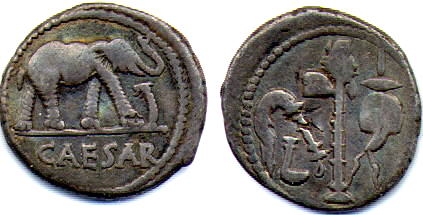 Silver Denarius, 17 mm, c.49 BC
Silver Denarius, 17 mm, c.49 BC
O: Elephant trampling on serpent. CAESAR below.
R: Simpulum, sprinkler, ax and priestly hat.
The obverse has been variously interpreted, but likely refers to Caesar's
recent military victories in Gaul. The reverse, displaying priestly
implements, refers to Caesar's office of Pontifex Maximus (chief priest).
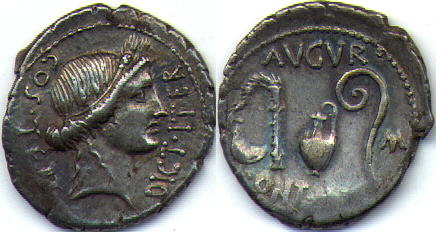
Silver Denarius, 19 mm, 46 BC
O: Head of Ceres. COS TERT DICT ITER.
R: Simpulum, sprinkler, jug and lituus (priestly implements).
AVGVR PONT MAX.
The obverse shows the goddess of corn and is symbolic of Africa's corn
producing wealth. In 46 BC Caesar was victorious against Scipio in
Africa. The "M" to the right in the reverse indicates that this coin
was part of Caesar's gift to his successful legions.
Gaius Julius Caesar rose from relative obscurity to supreme power in the late Roman republic. A brilliant general and formidable politician, he defeated all rivals to become dictator of Rome.
Caesar achieved distinction relatively late in life. His early career is noteworthy for opposition of the aristocratic Senatorial conservatives in favor of the more "common" man. For years a protégé of the powerful and immensely wealthy Crassus, Caesar was able to capitalize on the rivalry of Crassus with the equally powerful Pompey. In 60 BC, the three men formed the First Triumvirate, a pact which effectively divided rule among them.
In 58 BC, Caesar went off to Gaul (France ) to command military operations. In Gaul, Caesar's forces were almost always far outnumbered, and fought in foreign territory far behind enemy lines with great bravery, daring, and tactical skill. When his forces appeared to be losing ground, Caesar had a habit of rushing to the front lines, putting himself at great personal risk. Significantly, he was a charismatic leader who won the undying loyalty of his soldiers. Then and now, Caesar's Gallic campaign drew comparisons to Alexander the Great.
In the meantime, Crassus had died during a poorly-managed, ill-fated invasion of Parthia (Persia), leaving Pompey alone in Rome. Pompey and the Roman Senate grew wary of Caesar's tremendous popularity and miltary power, and ordered him to disband his army and return to Rome. Caesar realized he would be in great danger if he agreed. Instead, in 49 BC, he marched his army on Rome, which he took with ease, but not before Pompey fled to Greece.
Caesar defeated Pompey in Greece, and chased him to Egypt. While in the region, the 52 year-old Caesar met and was captivated by the 21 year-old Cleopatra. Cleopatra was, at the time, involved in a power struggle with her brother, Ptolemy XIII. Caesar intervened in her behalf, fighting the Alexandrian War of 47 BC during which Ptolemy XIII perished and Cleopatra's throne was secured. Soon after, Cleopatra gave birth to Caesar's child.
Returning to Rome, Caesar's power was unopposed. Not surprisingly, he was showered with great honors and awards, but Caesar desired more. Like his hero, Alexander the Great, Caesar wanted to conquer Asia. But it had been prophesied that Asia could only be subdued by a king, and Casear was merely a dictator with supreme power. In 44 BC, as Caesar was preparing to request the Senate for the use of the title "King" while outside of Italy, he has murdered by a large group of senatorial conspirators.
Casesar's murder has been portrayed as a noble act, an attempt to fight tyranny, avoid a monarchy and restore rule by the Senate. Those sentiments may have played a part with some of the conspirators (in particular Brutus.) However, it is noted that Caesar was consistently a threat to the Roman aristocratic elite. Caesar was in the process of greatly enlarging Senatorial membership, threatening to unsettle the social order that had served the largely elitist conspirators.
Following the assassination, Caesar's heirs, Antony and Octavian, were able secure Rome and defeat the conspirators. Eventually Octavian became the first Roman Emperor (Augustus), bringing the Roman Republic to an end.
Marcus Aurelius
Emperor of Rome, 161-180 AD, and Stoic Philosopher
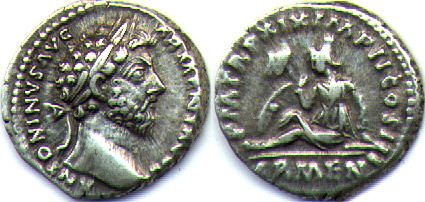
Silver Denarius, 17 mm.
O: Bust of Marcus Aurelius
R: Personification of Armenia seated on the ground, shield and
vexillum before her. This scene refers to the conquest of Armenia
in 164 AD.
Struck 164-5 AD in Rome.
Born Marcus Annius Verus, he was adopted by the emperor Antoninus Pius in 138 and married to his daughter Faustina a few years later. He succeeded to the throne on Antoninus's death.
Marcus Aurelius was a kind, competent, and respected monarch. He was a champion of the poor, for whom he founded schools, orphanages, and hospitals and alleviated the burden of taxes. He also tried to humanize criminal laws and the treatment of slaves by their masters. Nonetheless, he ruthlessly persecuted the Christians, believing them a threat to the imperial system.
Educated by the best tutors in Rome and Athens, Marcus was a devotee of Greek learning and of the philosophy of Stoicism. He is known for his Meditations, a 12 volume work which represents an important formulation of the philosophy of Stoicism. The work reveals his belief that the moral life leads to tranquility, and stresses the virtues of wisdom, justice, fortitude, and moderation.
Despite his impressive intellectual, leadership, and humanitarian skills, his reign is looked upon as a turning point in Roman history -- a turn for the worse. In contrast to the peaceful reign of his predecessor, his reign saw nearly constant warfare. Legions returning from the Parthian war brought with them a plague that spread throughout the empire. And when Marcus passed away -- perhaps from the plague -- he left behind an empire engaged in conflicts it could not win. He also left his throne to his son, Commodus, who soon became famous for his megalomania and incompetence.
Nero
Emperor of Rome, 54-68 A.D.

Silver tetradrachm (provincial issue made for use in the Roman province
of Syria), 25 mm.
Mint of Antioch
O: Nero facing right.
R: Eagle on thunderbolt. Date, in field: "Z / Theta - P",
or regnal year 7 / year 109 of the Caesarian era, which corresponds to
60-61 AD. Nero was about 23 years old when this coin was struck.
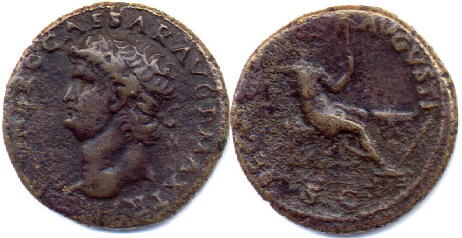
Bronze dupondius, 27 mm.
O: Nero facing left.
R: Securitas seated, altar at feet.
Lugdunum mint, c.67 AD. This coin, struck about 6-7 years after
the Antioch tetradrachm, shows Nero a little older and a lot fatter.
Nero Claudius Caesar was one of the most infamous Roman emperors. He was the son of Domitius Ahenobarbus and Caligula's sister Agrippina II. He owed his position to his ambitions mother. After Agrippina married Emperor Claudius I (her fourth marriage), she induced him to adopt Nero.
When Claudius died, Nero was hailed as the new emperor. Initially his reign was good, heavily influenced by Agrippina and two additional advisors (Seneca and Burrus). Nero resented Agrippina's interference and had her murdered in 59 AD. Burrus died and Seneca retired in 62.
In 62, he revived the wide-ranging law of treason, and people were executed on suspicion of offense. Executions increased in 65, when an assassination plot was uncovered. The poet Lucan, Seneca, the famous general Corbulo, and numerous other senators lost their lives.
In 64, a great fire ruined Rome. Nero lavishly rebuilt the city, but rumor held that he had started the fire himself to make room for his new palace and that he had recited poetry while watching the blaze. To avert this suspicion Nero blamed the Christians for the fire, thus initiating the first major Roman persecution of that sect.
Nero's great passions were sex, music, singing, acting, and chariot racing. In 67 he toured Greece; the Greeks held numerous games and awarded Nero all of the first prizes for his racing and musical performances in honor of his visit. As Nero devoted himself to artistic pursuits, he neglected the affairs of state, and the reins of power slipped from his hands. In 68 the governors of three provinces rose in an open revolt. When deserted by his guard, he committed suicide.

